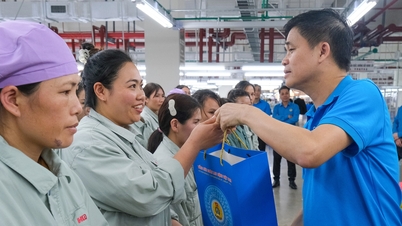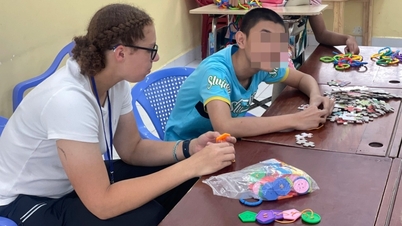Newborns have weak immune systems, so parents should proactively prevent illness during Tet by ensuring their children get enough sleep, not over-playing, and avoiding hugging and kissing.
Master, Doctor Trinh Thanh Lan, Neonatal Center, Tam Anh General Hospital, Ho Chi Minh City, said that children are susceptible to respiratory diseases, allergies, dermatitis, and digestive disorders during Tet. The cause may be due to changes in weather or improper care.
Doctor Thanh Lan gives 4 tips for parents to protect their children's health during Tet.
Hug and kiss the newborn baby
Newborn babies have weak immune systems, making them susceptible to infectious diseases. Showing affection to your baby through kisses can unintentionally spread many dangerous bacteria and viruses, including herpes, flu, mumps, hand, foot and mouth disease, chickenpox, measles, meningitis, etc.
According to a study published in December 2020 by Harvard University, USA, the human mouth contains trillions of bacterial cells. Each area in the oral cavity (tongue, teeth, gums, pharynx - throat) has a specific group of bacteria residing. This is a common source of disease transmission through actions such as kissing, sneezing...
Adults should wash their hands and wear masks when touching the baby. People with signs of respiratory illness such as cough, fever, and runny nose should not come into contact with the baby.
Dress children in new, unwashed clothes.
Many parents may try on new clothes or let their children wear them without washing them. New clothes must be washed before letting children wear them to protect them from the risk of allergies to fabric dust and dyes.
During the printing and dyeing process of clothes, manufacturers add formaldehyde to fix the color and prevent wrinkles. This substance is soluble in water and can be removed if the clothes are washed with water. On the contrary, if you buy clothes and wear them immediately without washing them, your baby will be exposed to formaldehyde for a long time, which can cause leukemia and nosebleeds, swelling, dermatitis, etc.

Parents make sure their children eat and sleep on time during Tet. Photo: Freepik
Flowers in the children's room
During Tet, many families often decorate their houses and rooms with flowers to give the space a fresh look. The fragrance of fresh flowers also helps everyone in the house feel comfortable.
Dr. Thanh Lan notes that fresh flowers or plants should not be placed in the infant’s bedroom. Fresh flowers and plants will breathe at night, absorbing oxygen and releasing carbon dioxide. If fresh flowers are placed in the bedroom, it can cause difficulty breathing.
Flowers with pollen also increase the risk of allergies, negatively affecting the baby's weak respiratory system. Some flowers grown for Tet may use additional pesticides, growth stimulants, flower chemicals... Therefore, parents should absolutely keep them out of reach of children.
Disruption of daily routines
During Tet, adults are often busy taking care of the house, preparing food, and welcoming guests, so the newborn's daily routine can be disrupted.
Parents should maintain their baby's daily routine as usual, avoid changing the biological clock, and pay attention to feeding the baby enough. On average, babies will need to drink milk every 2-3 hours, each feeding lasting about 10-15 minutes on each breast. When the baby is hungry or has not had enough, the baby may cry, suck his fingers, smack his lips continuously, and frequently wiggle...
During Tet holidays, babies' sleep is easily disturbed by parents' work or noise that wakes them up. Sleeping time is also divided, because after about 2-3 hours, babies have to drink breast milk or 3-4 hours for babies who drink formula milk. Therefore, parents should maintain a familiar, safe environment for their children to have a good night's sleep.
Dr. Thanh Lan recommends that women who breastfeed their children should pay attention to their diet during Tet to avoid the risk of food poisoning. Tet foods mostly contain a lot of sticky rice, fat, candy, pickled onions, and pickles; consuming too much can cause digestive disorders in breastfed babies.
Tue Diem
Source link


![[Photo] National Assembly Chairman Tran Thanh Man receives Chairman of the House of Representatives of Uzbekistan Nuriddin Ismoilov](https://vphoto.vietnam.vn/thumb/1200x675/vietnam/resource/IMAGE/2025/10/27/1761542647910_bnd-2610-jpg.webp)




![[Photo] Party Committees of Central Party agencies summarize the implementation of Resolution No. 18-NQ/TW and the direction of the Party Congress](https://vphoto.vietnam.vn/thumb/1200x675/vietnam/resource/IMAGE/2025/10/27/1761545645968_ndo_br_1-jpg.webp)










































































































Comment (0)